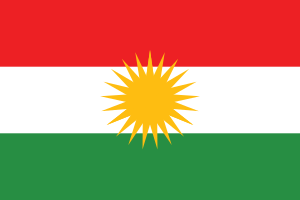Kurds in Sweden
Kurds in Sweden may refer to people born in or residing in the Sweden of Kurdish origin.
| Total population | |
|---|---|
| Approximately 85,000 | |
| Regions with significant populations | |
| Huddinge, Botkyrka, Västerås, Gothenburg, Örebro, Stockholm, Uppsala, Dalarna, Karlstad, Malmö, Borlänge | |
| Languages | |
| Kurdish, Swedish (some knowledge of Turkish, Arabic and Persian) | |
| Religion | |
| Majority Islam | |
| Related ethnic groups | |
| Iranian people |
Most Kurdish people in Sweden live in the capital Stockholm or in Uppsala.[1] A majority of Kurdish political refugees choose Sweden as their host country and therefore they have a cultural presence in Sweden.[2] As of 2017, 6 MPs in the Swedish parliament are of Kurdish descent.
Chronological Kurdish arrivals to Sweden
- 1967-1970 Two Kurdish students from south Kurdistan were expelled and fled to Sweden where they continued their studies.
- 1971-1975 A military coup in Turkey and the peace agreement in Iraq was established. Many Kurds left those countries and went to Uppsala.
- 1975 Huddinge becomes the first municipality offering Kurdish as a primary language.[3]
- 1976-1980 Kurds lest different parts of Kurdistan for Sweden due of the military coup in Turkey, the mass killings in the Maraş Massacre, the war against Saddam Hussein in Iraqi Kurdistan, the revolt against the Shah in Iran, and the ill-treatment of the Kurdish population in Syria by the Baath-regime .
- 1984 The education of Kurdish teachers in Stockholm begins.[4]
- 1981-1985 During the military junta in Turkey, the Kurdish opposition fled to Syria and Iraq. The war between Iran-Iraq and the subjugation of Kurds in both of the countries intensified.
- 1986-1990 The Turkish regime's mistreatment of the Kurdish population fuels immigration to Sweden.[5]
- 1991-1995 The crises in Kuwait due to Iraqi invasion, the war in south Kurdistan, and mass exodus from north Kurdistan into Iran.[6]
Integration issues
The 26-year-old Kurdish woman Fadime Şahindal was murdered by her father in an honour killing in 2002.[7][8][9] Kurdish organizations were criticized by prime minister Göran Persson for not doing enough to prevent honour killings.[7] Pela Atroshi was a Kurdish girl who was shot by her uncle in a brutal honour killing.[10] The murder of Pela and Fadime gave rise to the formation of the human rights organization Never Forget Pela and Fadime (GAPF). GAPF is a politically and religiously independent and secular nonprofit organization working against honor-related violence and oppression. The organization's name is taken from Pela Atroshi and Fadime Sahindal which is Sweden's best-known and high-profile cases of honor killings.[11][9] The honor killing of Sara, an Iraqi Kurdish girl, was the first publicized honor killing in Sweden.[9][12][13] These three prominent cases of Sara, Pela and Fadime, brought the notion of honour killings into Swedish discourse.[7]
Notable Kurds in Sweden
- Sirwan Kakai
- Amineh Kakabaveh
- Bovar Karim
- Darin
- Dilba Demirbag
- Dilnarin Demirbag
- Dilsa Demirbag Sten
- Gulan Avci
- Jiloan Hamad
- Mervan Celik
- Mustafa Can
- Nalin Pekgul
- Özz Nûjen
- Rawez Lawan
- Reşo Zîlan
- Soran Ismail
- Tino Sanandaji
- Nisti Stêrk
- Pela Atroshi
References
- Eldén, Åsa (2004): Life-and-Death Honour: Young Women's Violent Stories About Reputation, Virginity and Honour – in a Swedish Context. In: Mojab, Sharzad/Abdo, Nahla (Hg.): Violence in the Name of Honour. Istanbul: Istanbul Bilgi University Press: 91-100
- Rizvi, Javeria (2004): Violence in the Name of Honour in Swedish Society: What Lessons can be learnt from the Swedish Experience. In: Mojab, Shahrzad/Abdo, Nahla (Hg.): Violence in the Name of Honour. Istanbul: Istanbul Bilgi University Press: 211-223
- Wikan, Unni (2008): In Honor of Fadime: Murder and Shame. Chicago: University of Chicago Press
- Wikan, Unni (2004) Deadly Distrust: Honor Killings and Swedish Multiculturalism. In: Hardin, Russell (Hg.): Distrust. New York: Russell Sage Foundation: 192-204
External links
References
- "Stilla protest mot massaker". Archived from the original on 10 July 2012. Retrieved 19 August 2017.
- http://www.saradistribution.com/img/saradistr_press1.gif
- [Rohat Alakom - Kurderna, fyrtio år i Sverige s.98]
- [Rohat Alakom - Kurderna, fyrtio år i Sverige s.97]
- "PalmeCenter.se". Archived from the original on 2007-10-25. Retrieved 2008-06-24.
- Chatelard, Géraldine, Centre on Migration, Policy and Society, Working Paper No. 68, University of Oxford, 2009, Migration from Iraq between the Gulf and the Iraq wars (1990-2003):Historical and socio-spatial dimensions Archived 2016-01-11 at the Wayback Machine
- Hellgren, Zenia; Hobson, Barbara (1 September 2008). "Cultural dialogues in the good society: The case of honour killings in Sweden" (PDF). Ethnicities. 8 (3): 385–404. doi:10.1177/1468796808092449.
- "Kurd killing sparks ethnic debate". CNN. 5 February 2002. Retrieved 4 May 2010.
- vgs.univie.ac.at/_TCgi_Images/vgs/20080527171708_HSK27_Wikan.pdf
- "Australian links to brutal honour killing". Retrieved 19 August 2017.
- "Riksorganisationen GAPF - Glöm aldrig Pela och Fadime". Retrieved 19 August 2017.
- https://books.google.com/books?id=kuuFAwAAQBAJ page 198
- https://books.google.ch/books?id=6FH4KdYGhttps://books.google.ch/books?id=6FH4KdYGYYIC%5B%5D page 277

